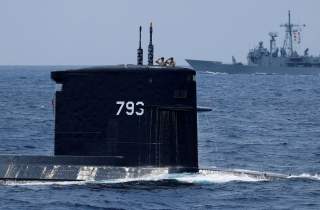Taiwan Desperately Needs This 1 Thing to Stop China if War Comes
New subs.
What are Taiwan’s military capabilities, and does Taiwan stand a chance of repelling a prospective Chinese invasion?
Taipei and Beijing are seemingly sliding into an escalatory spiral amid a flurry of veiled threats and accusations.
Just last week, China’s defense minister invoked Abraham Lincoln to justify the Chinese Communist Party’s (CCP) increasingly aggressive reunification policy: “American friends told me that Abraham Lincoln was the greatest American president because he led the country to victory in the Civil War and prevented the secession of the U.S. The U.S. is indivisible, so is China. China must be and will be reunified.” Meanwhile, Taiwan’s government called on China to “ repent” on the coming 30th anniversary of the 1989 Tiananmen Square protests.
(This first appeared earlier in June 2019).
Much of the media coverage of the ongoing Taiwan-China dispute is focused on the international repercussions of another Taiwan crisis; more specifically, on how Washington would react to Chinese military aggression against Taiwan.
But what are Taiwan’s military capabilities, and does Taiwan stand a chance of repelling a prospective Chinese invasion? The National Interest previously looked at the Taiwanese air force (ROCAF). We now turn to Taiwan’s navy.
As a maritime nation embroiled in a serious military dispute with a larger neighbor, Taiwan’s navy (ROCN) is unique for their nearly utter lack of a submarine force. Taiwan’s submarine roster consists of one US-purchased Hai Shih submarine, the last of the WWII-era Tench-class line to remain in service in 2019, and a handful of Dutch-made Hai Lung submarines procured in the 1980’s.
As with many of ROC’s military shortcomings, Taiwan’s submarine deficit is the byproduct of a postwar strategic culture in which Tapei saw itself as a major regional power, compensating for the PLA’s numerical advantage with superior training and equipment. But after decades of breakneck Chinese military modernization coupled with creeping Taiwanese military stagnation, Taiwan’s surface navy is no position to contest the South China Sea in any kind of pitched conflict with the People’s Liberation Army Navy. Taiwan’s political leadership has only recently begun to come to grips with the reality that sea-control is no longer a viable military strategy. Instead, Taiwan’s only recourse against a qualitatively and quantitatively stronger Chinese navy lies in Anti-Access/Area-Denial (A2/AD) tactics. A sizeable fleet of modernized Taiwanese attack submarines could impose serious costs on Chinese vessels operating in the Taiwan Strait, ambushing their target with close-distance torpedo or anti-ship missile saturation strikes.
There is a strong precedent for this style of asymmetric naval warfare in the form of the Falklands war, but we need not reach back to the 1980’s. Iran is currently pursuing an analogous submarine-based A2/AD strategy to successfully contest the Persian Gulf against the much larger and more powerful US navy.
Slowly but surely, Taipei appears to be coming around to the wisdom of asymmetric submarine warfare. Seizing on Washington’s newfound appetite for military aid to Taipei, the Taiwanese have taken the major step of constructing a dedicated submarine production facility. The factory will be operational next year, with the first prototype of an indigenously-produced diesel-attack submarine scheduled for 2024. Taipei’s costly, ambitious venture was enabled by the Trump administration’s 2018 approval of a marketing license for Taiwan to procure submarine components and technology from American manufacturers.
This is a major, if not long overdue, first step in Taiwan's long and difficult road to naval modernization. The project’s long-term prospects undoubtedly depend on continued American military support, which has historically ebbed and flowed between administrations. Nonetheless, a submarine fleet geared toward area denial operations is, and will likely remain, Taiwan’s best bet to counter Chinese sea power.
Mark Episkopos is a frequent contributor to The National Interest and serves as research assistant at the Center for the National Interest. Mark is also a PhD student in History at American University.
Image: Reuters.

